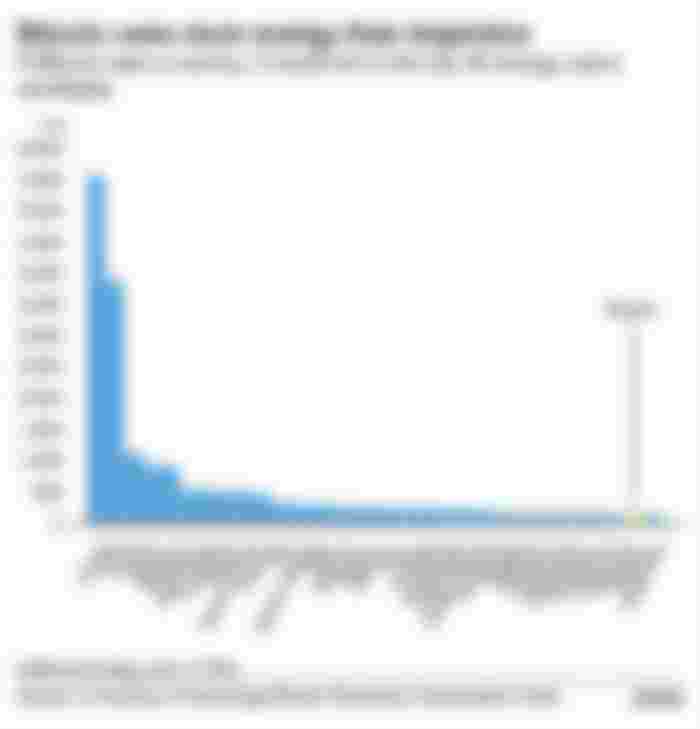Even some of Bitcoin's most ardent detractors have given up in the last year due to the currency's relentless rise. For example, Kevin O'Leary used to call Bitcoin "garbage," but now says he has 3% of his portfolio in BTC and ETH. Indeed, many people, including ourselves, have been calling Bitcoin a bubble for years, but it continues to rise. Skeptics are finding it increasingly difficult to resist the pressure, especially as some well-known figures appear to be embracing crypto.
Tesla, led by Elon Musk, has invested $1.5 billion in Bitcoin and has stated that it is considering allowing customers to pay for their vehicles using the cryptocurrency. Mastercard, the payments behemoth, has revealed that it will soon begin promoting a limited number of cryptocurrencies on its network. PayPal is following suit. Goldman Sachs is reopening its crypto trading desk, and Bank of New York Mellon is forming a new division to assist clients in holding and transferring digital assets.
Tesla's Bitcoin investment seems nothing more than another speculative gamble by the company's eccentric CEO. In terms of Mastercard, Goldman Sachs, and Bank of New York Mellon's involvement, it's worth noting that none of these massive financial institutions is using Bitcoin for their own business operations. Clients who trade cryptocurrency would simply pay them fees. This is a significant distinction. To put it another way, none of them are actually caress it.
They're simply taking advantage of the current frenzy to boost their profits. So, if you're considering purchasing Bitcoin because big names are doing so, think twice. Amazon owned 54 percent of Pets.com at one point during the dot-com boom in the late 1990s. This was interpreted by many as a confirmation of the latter's business model. Pets.com, unfortunately, went bankrupt and was liquidated in 2000.
The big guys are just as susceptible to fads as the rest of us.
“The investor is neither right nor wrong because others approved or disagreed with him; he is right because his facts and analysis are right,” said Ben Graham, the father of value investing
What are the facts, then? Will Bitcoin really become a global payment network, displacing the US dollar as the world's most widely used currency?
Debunking the Myth: Bitcoin can become the next global currency
It is physically and mathematically unlikely for Bitcoin to become a global currency.
This is why!
Bitcoin is a payment system that is incredibly inefficient. Forget about all of the dangers that its extreme volatility presents to any real company or person. We're concerned about how many transactions the Bitcoin network can handle and how much energy it uses.
Visa's payments network, which is Mastercard's main rival, can handle up to 1,700 transactions per second. Mastercard can process approximately 561 transactions per second. Bitcoin, on the other hand, only makes it to number seven.

Yes, you read that correctly. By design, it's not 7000, but just... 7. Worse, only about a third of those seven transactions per second are real purchases of goods and services. Instead, they are simply transfers from one speculator's account to another.
A good article about why Bitcoin is unsuitable as payment method was also written by cain. You can read it here,
Mythbusting: 10-minute confirmation time makes Bitcoin unsuitable as a 'cash' method of payment
The Bitcoin network's biggest flaw is the amount of energy it consumes to process those meager 7 transactions every second. If Bitcoin were a nation, it would be among the top 30 in the world in terms of energy consumption, according to the chart below, which was published by the BBC on February 10.

Bitcoin was using more energy than Argentina two months ago. To be precise, over 121 terawatt-hours per year. However, for Bitcoin, a month is a long time. The Bitcoin network is becoming more inefficient, not less, as the complexity of the mining method, which validates transactions, is designed to increase with time.
According to the Cambridge Bitcoin Electricity Consumption Index, the largest cryptocurrency now consumes 128 TWh per year, surpassing Norway and edging closer to Ukraine and Sweden.
To compete with a real global payment network, Bitcoin will have to magically increase its transaction ability by a factor of 10,000, to 70 000 transactions per second. The issue is that its energy usage will increase in lockstep. 128 TWh multiplied by 10,000 equals 1 280 000 TWh, according to simple arithmetic. By the way, the whole planet consumes about 24 000 TWh of energy each year.
That's right. Bitcoin would need over 53 times more electricity than the entire planet if it were to become a true global payment system. Let's go a little further with this. Electricity isn't the only source of energy. Coal, oil, and gas, as well as heat and biomass, are all available. People use a metric called tons of oil equivalent, or toe, to place all the energy generated from various sources on an equal footing.
According to Enerdata, the total amount of energy generated in the world in 2019 was slightly less than 15 000 million toe (15 000 000 000 toe = 174 450 TWh). In a given year, this is the cumulative amount of energy generated in the world from all sources. And it's still 7.3 times less than the amount Bitcoin will need to become a functional global payment network.
To put it another way, even if we put all of the energy currently used for raw material mining, transportation, farming, food processing, and manufacturing of all kinds of goods and services into the Bitcoin network, we would not even be able to turn it into a global payment system.
Conclusion
Bitcoin to become the next global currency is something that we can never look forward in the future. It is just impossible!
We have only discussed Bitcoin network's transaction limit per second and it's massive consumption of energy, other than that, there are still some major factors that hinders Bitcoin from becoming one such as: expensive transaction fees, price volatility, and capacity to scale.
A global currency is a currency that is meant and built for everyone not just for those who can afford to transact on it.
Love the article? I accept 🌶️SPICE TOKENS too,
simpleledger:qpygjdvns8e0eurf6ae8r74cx526q54rtq5dpsk3u4

References:
https://news.bitcoin.com/shark-tanks-kevin-oleary-bitcoin-cryptocurrencies-here-to-stay-invests-portfolio/
https://www.reuters.com/article/us-crypto-currency-goldman-sachs-exclusi-idUSKCN2AT390
https://en.m.wikipedia.org/wiki/Pets.com
https://www.bbc.com/news/technology-56012952
https://yearbook.enerdata.net/electricity/electricity-domestic-consumption-data.html
https://cbeci.org/
https://yearbook.enerdata.net/total-energy/world-energy-production.html
Lead image from Pixabay



I was going to start beating you up over saying that Bitcoin wasn't going to be the currency of the future, but then I saw that you were referring to Bitcoin Core and not Bitcoin Cash. hehe., Cheers!